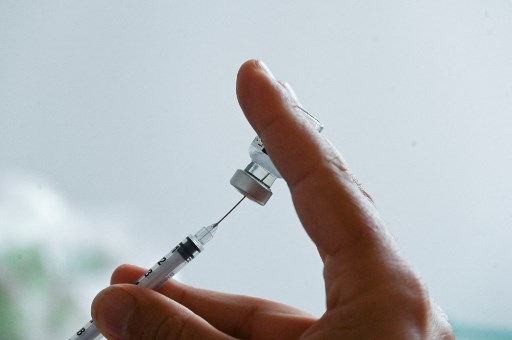Vietnam aiming for slice of vaccine tech-transfer
 |
| Illustration photo, DENIS CHARLET / AFP |
A number of vaccine transfer-and-produce initiatives have been endorsed by the Ministry of Health (MoH) through Decree No.2301/QD-BYT released on May 7 on the establishment of a steering committee for COVID-19 vaccine research and production technology transfer, to beef up vaccine production from Vietnam to around 200 million doses by the first half of 2022. Among them, Vietnam has successfully secured tech transfer from Japan, Russia, and the United States.
Vietnamese firms AIC and Vabiotech have inked a deal with Japan’s Shionogi & Co., Ltd. to produce COVID-19 vaccines. The deal was subject to a confidentiality agreement but would be based on the local production of recombinant protein-based vaccines. The MoH is preparing to conduct phase three clinical trials for Shionogi’s vaccine in Vietnam and it is hoped the vaccine will be rolled out to the market by June next year.
Meanwhile, the Russian Direct Investment Fund and Vabiotech are actively cooperating in the tech transfer process to provide easier access to Sputnik V vaccines for the population of Vietnam. The first batch of Sputnik V was produced in Vietnam, and it is expected that the tech transfer from Russia will be completed by the end of 2021.
For related initiatives with US partners, the MoH has sent a group of experts to coordinate with the World Health Organization (WHO) to support relevant units in completing dossiers for clinical trial phases 1-3 according to a shortened process, with the research expected to start on August 1 and end in late December. The transfer and building of a vaccine factory in Vietnam will be completed in June 2022.
Vietnamese behemoth Vingroup was also in talks with San Diego-headquartered Arcturus Therapeutics Holding on mRNA vaccine production. Clinical trials could begin in Vietnam in August, adding that the firms could produce 100-200 million doses a year under such a deal.
Pham Cong Hiep, senior lecturer and research cluster lead at RMIT University, said that it is clear the government is taking decisive action to establish Vietnam as a world vaccine supply source through technology transfer agreements and domestic research and development.
Hiep pointed out Vietnam can take advantage of its high-quality infrastructure in industrial zones, and experienced workers in many high-tech firms to participate deeper in the value chain of vaccine production. “This can contribute to reducing global shortages and making vaccines more affordable to less developed countries like Vietnam. Importantly, participating in the vaccine supply chain can enhance the country’s ability to counter future pandemics as COVID-19 may not be the last,” Hiep added.
According to Nguyen Manh Hung, another lecturer of RMIT University, the COVID-19 vaccine supply chains differ significantly from traditional vaccine supply chains in their scope, objectives, and regulated platforms. Asian countries like South Korea and Indonesia have quickly engaged in tech transfer hubs to move a step closer to the ambition to become a major vaccine manufacturing centre. South Korea is also willing to offer its state-of-the-art facility and skilled human resources with GMP-standard practices. However, limited sources of supply create a significant bottleneck in low-to-middle-income countries such as Vietnam.
The WHO reported that 80 per cent of global sales for coronavirus vaccines so far come from five large multinational corporations. Traditional vaccine supply chains for less developed regions have often been initiated from the Developing Countries Vaccine Manufacturers Network, multi-agencies, and donors such as the European Vaccine Initiative and International Vaccine Institute. The COVID-19 vaccine supply chains have multiple approaches and often accompany bilateral connections.
As reported by Reuters, South Korea has approached Pfizer, Moderna, CureVac, and BioNTech in a step closer to its ambition to become a major vaccine manufacturing centre. Indonesia is enlarging the Sinovax supply chains to provide the vaccine to the Asia-Pacific region.
According to Hung, original vaccine manufacturers are now under pressure to forgo their patents to support poor countries, and many producers are now willing to transfer vital know-how to various countries. For example, BioNTech is basing its regional centre and a new factory in Singapore for its vaccines as part of steps taken by the company to address the increasing demand locally.
However, he added this process depends not only on the needs of the local markets but also on the government direction and national vaccine production capability. “Vietnam should take measures for accelerated approvals through a fast-track approving system for vaccine manufacturing-related ventures, including related logistics to speed up manufacturing locally,” Hung noted.
What the stars mean:
★ Poor ★ ★ Promising ★★★ Good ★★★★ Very good ★★★★★ Exceptional
Themes: Healthcare Platform
- Hanoi intensifies airport monitoring amid Nipah disease risks
- Cosmetics rules set for overhaul under draft decree
- Policy obstacles being addressed in drug licensing and renewal
- Sanofi, Long Chau Pharmacy relaunch medicine blister pack collection initiative
- Takeda Vietnam awarded for ongoing support of Vietnam’s sustainability efforts
Related Contents
Latest News
More News
- Foreign leaders extend congratulations to Party General Secretary To Lam (January 25, 2026 | 10:01)
- 14th National Party Congress wraps up with success (January 25, 2026 | 09:49)
- Congratulations from VFF Central Committee's int’l partners to 14th National Party Congress (January 25, 2026 | 09:46)
- 14th Party Central Committee unanimously elects To Lam as General Secretary (January 23, 2026 | 16:22)
- Worldwide congratulations underscore confidence in Vietnam’s 14th Party Congress (January 23, 2026 | 09:02)
- Political parties, organisations, int’l friends send congratulations to 14th National Party Congress (January 22, 2026 | 09:33)
- Press release on second working day of 14th National Party Congress (January 22, 2026 | 09:19)
- 14th National Party Congress: Japanese media highlight Vietnam’s growth targets (January 21, 2026 | 09:46)
- 14th National Party Congress: Driving force for Vietnam to continue renewal, innovation, breakthroughs (January 21, 2026 | 09:42)
- Vietnam remains spiritual support for progressive forces: Colombian party leader (January 21, 2026 | 08:00)

 Tag:
Tag:


















 Mobile Version
Mobile Version